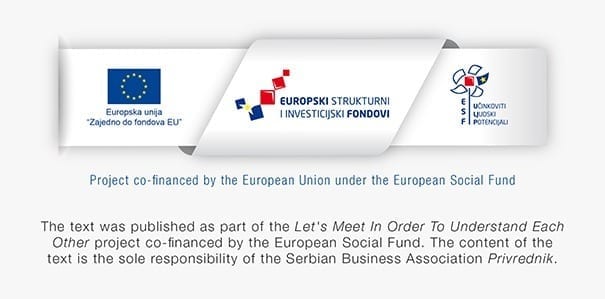If Eustahija Arsić, whose anniversary we wrote about recently, is the first poetess of modern Serbian history, Jelena J. Dimitrijević, a generation later, is the first female prose writer. Nevertheless, it would not be enough to remember her only for her prose (and poetry). She is one of the most interesting and possibly most mysterious figures of Serbian culture of the last two centuries.
Jelena Dimitrijević was born in Kruševac on this day in 1862, a fact which becomes rather more remarkable when we take her life and work into account. Born in the wealthy merchant family of the prince of Aleksinac, who once supported Karađorđe’s rebels, Jelena Dimitrijević would go on to become a polyglot – she spoke French, English, Russian, Italian and Greek – and then a world traveler, doubtlessly the first Serbian female “globetrotter” and cosmopolite. As a woman with a developed consciousness about the position of women in her time, she traveled widely, explored different cultures and especially the female influence on those cultures. In this, she anticipated very early those tendencies from which the local feminist movement would develop decades later, as well as cultural studies, very popular in the last few decades. Therefore, her place of birth becomes a crucial fact when we consider that almost all the women who contributed to the national culture until the 20th century were Serbian women born and raised outside Turkish Serbia. The fact that Jelena Dimitrijević was born in the not entirely independent Principality of Serbia and that, in just two generations of her family, she became one of the most progressive spirits of the nation, an intellectual who wrote travel and literary prose, poetry and essays on culture – all this is a testimony and metaphor par excellence for the gigantic leap forward Serbia took in such a short time, bridging the unfathomable civilizational abyss it was in during the lifetime of Jelena’s grandfather. So, in two generations, from the collaborators of Karađorđe’s rebels in a Turkish province without a single school to a world traveler, writer and fighter for women’s rights.
Today, what Jelena Dimitrijević is best known for in expert circles, especially those of a feminist orientation, is not her artistic writing. Interested in the lives of Turkish women in Niš since youth, she learned the Turkish language and customs and managed, probably through extraordinary tact and respectfulness, to enter harems in Skopje, Thessaloniki, Istanbul and even further to the east. Readers today may be confused by this. Hadn’t Serbia, they may think, which had spent so many years under Turkish rule, gotten to know Muslim life and customs by then? It is through the way Jelena Dimitrijević approached this subject in her work, first in Letters from Niš about Harems (1897), that we see how these two cultures – Christian, i.e., European, and Muslim – remained separated in many ways. Another unintentional irony, evident to anyone who wants to see it from today’s perspective, arises. Although she was born, grew up and started writing right at the time that Serbia broke free from the centuries-long Turkish rule and gained independence while still bearing the marks of the conquerors’ culture (mostly in a negative sense), Jelena Dimitrijević writes about the world of Muslim women from an entirely Western, rationalist, enlightened, “anthropological” perspective. As an intellectual from a country which will be exoticized by the Western gaze for another century (and to this day) and where oriental influences are evident almost everywhere, Jelena Dimitrijević exhibits both a closeness and a distance towards her own society marked by Turkish rule. Such an unusual position by this writer opens up a range of cultural, culturological, anthropological, ideological and even psychological questions that remain mostly unanswered to this day.
After traveling through Asia, North Africa and most European countries, she turned to the West, the symbol of education, science, enlightenment and personal freedoms. In 1919, she traveled to the US, which, along with the world of American women, would fascinate her. They are the subject of New World or a Year in America, the first Serbian travelogue about the US, which contains a highly intriguing sentence: “Of all the women I have met abroad, Turkish and American women interest me the most.” In this one sentence, she seems to anticipate a much wider issue intensely relevant to this day.
She was a figure of emancipation, even transgression, without a doubt. Although Jelena was married (her husband, like many from that heroic and tragic generation, was killed in the Great War), her interest in women’s issues and women in general, the erotic motives in her poetry and her appearance – along with the clothes of the time, she wore, extremely provocatively, a top hat and carried a cane – earned her the epithet “Serbian Sappho”, after the legendary ancient Greek poetess from Lesbos.
In this regard, her novel New Women, published by the Serbian Literary Cooperative in 1912, is of central importance. The publisher is important for obvious reasons, and it is fascinating that the person who recommended this novel to the esteemed publisher was Pavle Popović, the most important anthologist and historian of Serbian literature along with Jovan Skerlić. The novel’s subject is the life of Turkish women in Thessaloniki at the beginning of the century, and the 18-year-old heroine is a character at the crossing point between two worlds and periods (and, astoundingly, sexual choices). The oppressive, traditionalist society on one side and her Western-based education on the other is, rhetorically, the focal issue of the novel. In a realist manner, Jelena Dimitrijević describes with precision the customs of the Turkish society, rituals and social events such as weddings, as well as, most intriguingly, customs of the harem. This would all be in line with the exotism of the time – with the difference that the author herself is from a society exoticized by the “true” Western culture – were it not for the extremely daring and transgressive motifs that, even today, would shock most readers – namely the lesbian and even incestuous fantasies. In a period almost a century later, postmodernism, the use of documentary devices and the insertion of text from letters and journals will be especially interesting to the small circle of narratologists who will study Jelena’s thematically fascinating novel. The fact that a novel of this theme and motifs was awarded the Serbian Literary Cooperative’s annual award is a powerful and inspiring insight into the cultural and social climate of the time in the Kingdom of Serbia, by then independent for almost three decades. It also radically contradicts some understandable notions of today’s readers about the conservatism of the period. Of course, after that, the novel was marginalized and even forgotten for both obvious and complex reasons and was absent from important anthologies and studies until our time, which is concrete proof of the conservatism of anthologies. The influential and serious Jovan Deretić skips New Women, while Predrag Palavestra states the theme of the novel curtly and obliquely, deeming it (justifiably) of small literary worth, but pointing out the emancipatory element of the novel as an expression of a new age in culture.
New interpretations and validations of this novel arrived in the last thirty years, usually from a feminist, cultural or the standpoint of literary theory. Today, despite all the difficulties and the terrible trauma experienced by our country and its cultural institutions in those thirty years, Jelena Dimitrijević is studied and written about more and more. What is more, in this feminist-academic milieu, she is seen as a radical figure of women’s cultural history and has earned somewhat of a posthumous “cult status”. That is not a bad outcome after the kind of status she had near the end of her life and decades after.
Jelena lived a long life, especially for that generation, surviving even the Second World War and the occupation, although for a short time. She died in Belgrade on 10 April 1945, half a year after the liberation of the city, while the final battles for the liberation of the country were still being fought. After her death, as with many notable Serbian women, a period followed that is described by that shameful phrase – “she and her work were forgotten”. Since the 1960s and the birth of the feminist movement in our region and thanks to the revision of the literary canon and the work of literary historians, Jelena Dimitrijević’s work is studied again, especially – ironically – since the 1990s and another political breakup and conflict. On the other hand, it is no wonder there is renewed interest in such an extraordinary and unique life within our cultural history and in the social and cultural work of Jelena Dimitrijević. Her prose (stories and one novel, New Women) and poetry were not considered by critics then and now to be of great literary worth. Commenting on her literary beginnings, Skerlić says that “she arrived on the literary scene with decidedly mediocre poetry” but concludes that “although not particularly original or powerful, with monotonous subjects and written in a rather bland style, these works have an attractiveness and an audience of their own.” What is of real literary importance is the fact that Jelena is the first modern Serbian author who wrote poetry in a dialect – the Niš dialect (for example, the poem “Baba Krasa: U moj zeman i sg”, which translates to “Grandma Krasa: In My Time and Now”), while Letters from Niš about Harems and the novel New Women remain important works due to their obvious thematic innovativeness. Literarily, her best work is probably her travel writing.
Today in Niš, the subject of probably her most important work, a bust has been erected in her honor, streets bear her name, a documentary for the Radio Television of Serbia was filmed as part of the program “The Women Who Pushed Boundaries”, and she lives on as a character in the novel My Dear Jelena by Ivanka Kosanić.
Jelena Dimitrijević’s motto was – “to read and to travel”. She faithfully followed that rule, writing tirelessly – about the poor position of women and the terrible patriarchy in the world and especially in Serbia. She was a world traveler and a woman who pushed boundaries and destroyed stereotypes. Nevertheless, her cosmopolitism did not clash with her sense of belonging and patriotism. She left her house in Francuska Street in Belgrade to the Serbian Academy of Sciences and Arts to fund the further education of female students abroad. Today, however, a wrong, binary division is often present in circles that deal with women’s issues and patriarchy in our region. According to it, any cosmopolitan and emancipatory attitude and involvement in women’s issues excludes national belonging and love towards one’s nation. Concerning this matter, too, we could learn from Jelena Dimitrijević that that is not true. On the contrary.
Translation from Croatian: Jelena Šimpraga

This post is also available in: Hrvatski







